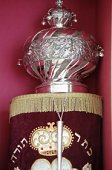INTRODUCTION
In this study, we
will learn about the birth and early life of Yeshua (Jesus)
in the context of first century Jewish background and
customs. This study will deal with the baptism and the
temptations of Yeshua (Jesus). His baptism and temptations
prepared Him for His public ministry.
I. THE BAPTISM OF JESUS
The baptism of Jesus was
the last act of His private life and the first act of His
public life. It was on this occasion that His public
ministry was officially anointed by the Holy Spirit, though
He did not actually ďgo publicĒ until a little while later.
While His public ministry did not begin at that point, His
public life indeed did.
Six months before Yeshua was actually identified by John as
the Messiah at His baptism, John had already begun a
ministry of preaching and had announced that the coming of
the Messiah was very, very near. People were to prepare
themselves for the reception of the Messiah. To prepare
oneself for the Messiah meant to do three things: first, to
repent, to come back to God; secondly, to believe the
message that the King and the Kingdom are soon to come;
thirdly, to publicly affirm oneís own repentance and faith
in the preaching of the Kingdom by being baptized by John.
A. The Purpose of
Baptism
The baptism of John and
the baptism of the Church are not the same thing. The basic
idea behind baptism is ďidentification.Ē When one is
baptized, he identifies himself with a person and/or message
and/or group. In fact, baptism was a Jewish practice long
before it became a practice of the Church. Among the things
that a Gentile had to do when he converted to Judaism was to
be baptized. When a Gentile was baptized into Judaism, he
was identifying himself with the Jewish people and with
Judaism as his religion.
In the baptism of the Church, one identifies with the death,
burial and Resurrection of the Messiah according to Romans
6. In the case of Johnís baptism, which was the baptism of
repentance, those who were baptized by him identified
themselves with the message of John and prepared themselves
to accept the Messiah. Those who were baptized by John
identified themselves with the message of the preparation of
the Kingdom. Therefore, Johnís baptism is not the same as
the baptism of the Church.
That is why those who were baptized by John had to be
baptized later into the baptism of the Church. One example
of this can be found in Acts 19:1-7. These disciples of John
had received his message and they committed themselves by
Johnís baptism to accept the Messiah once He was made known.
Unfortunately, they had left Israel before Yeshua was
identified as the Messiah. When they met Paul in Ephesus, he
told them who the Messiah was. In keeping with their
commitment when they were baptized by John, they received
Jesus as the Messiah, so Paul then proceeded to baptize them
into believerís baptism since Johnís baptism was not the
same thing. We should keep in mind that the baptism which
Jesus underwent was not proselyte baptism, nor was it the
baptism of the Church: it was Johnís baptism of repentance.
Matthew 3:14 states: But John would
have hindered him, saying, I have need to be baptized of
you, and come you to me?
John recognized that Yeshua was the Messiah and did not need
to repent; He would have no need to come back to God. So why
would He bother to subject Himself to Johnís baptism in
light of the fact that He had no need for repentance?
Obviously, He was not baptized in order to show that He was
repenting from His sins; He had none. Why, then, did Yeshua
subject Himself to Johnís baptism?
B. The Purpose
of Jesusí Baptism
There are six basic
reasons for the baptism of Jesus. First, Yeshua was
baptized, in His own words, to
fulfil all righteousness (Mat. 3:15). Since the
basic meaning of the act of baptism is ďto be identified,Ē
He was identifying Himself with righteousness. In
particular, He was showing in a visible way that He was
going to fulfill the righteousness of the Law; He was going
to fulfill the righteousness, which the Old Testament Law
and the Prophets demanded of the Messiah.
The second reason that Yeshua was baptized was to be
identified with the preaching of the Kingdom. Not only was
John preaching repentance - something with which Jesus did
not need to be identified - but John was also preaching the
coming of the King and the Kingdom.
A third reason that Yeshua was baptized was to be made known
to Israel. On this occasion, He would be publicly identified
as the Messiah Himself.
A fourth reason that Jesus subjected Himself to baptism was
to be numbered and identified with the believing Remnant
being prepared by John.
The fifth reason that Yeshua was baptized was to be
identified with sinners. Not to be identified as a sinner,
but to be identified with sinners, according to II
Corinthians 5:21: Him who knew no
sin he made to be sin on our behalf; that we might become
the righteousness of God in him. Paul reaffirmed
the fact that Yeshua had no sin; He knew no sin [He
experienced no sin on His part but] he [was] made . . .
sin on our behalf; to fulfill all righteousness. In order to
fulfill all righteousness, He became sin. Thus, by
connecting Matthew 3:15 with II Corinthians 5:21, He was
baptized to be identified with sinners.
The sixth reason that Jesus was baptized is found in Acts
10:38: ... even Jesus of Nazareth,
how God anointed him with the Holy Spirit and with power:
who went about doing good, and healing all that were
oppressed of the devil; for God was with him.
Jesus was baptized to receive the special anointing for His
ministry, the anointing of the Holy Spirit. Since it was at
His baptism that the Holy Spirit came down on Him, by
connecting what happened at the baptism with Acts 10:38, it
is clear that it was on this occasion that He received His
special anointing by the Holy Spirit for His mission.
At His baptism the entire Triune God appeared in that the
Son was seen in the person of Yeshua standing in the water;
the Holy Spirit was seen in visible form, for He came bodily
in the form of a dove (Mat. 3:16, Lk. 3:22); while the third
Member made His appearance, not visibly as it was with the
Son and Holy Spirit, but by an audible voice. In Matthew
3:17, God the Father spoke out of heaven and said:
... and lo, a voice out of the
heavens, saying, This is my beloved Son, in whom I am well
pleased.
At the baptism of Yeshua, the whole Triune God appeared. On
this occasion, Yeshua was anointed by the Holy Spirit for
His mission and was verbally identified as the Messiah by
God the Father.
Three different times in the ministry of Jesus, God the
Father spoke audibly out of heaven. The first time was at
the baptism, the second time at His transfiguration, and the
third time towards the end of His ministry according to John
12:28.
II. THE TEMPTATIONS
OF JESUS
The clear relationship
between the baptism of Jesus and the temptations of Jesus
should not be missed. This connection is seen in two ways.
First, at the baptism of Yeshua, He said that He came to
fulfil all righteousness. At the temptations of Yeshua, this
righteousness was tested.
Secondly, at the baptism of Jesus, He was declared to be the
Son of God by God the Father. At the temptations of Jesus,
He was told to prove it.
Of the four Gospels, three deal with the temptations:
Matthew, Mark and Luke. All three Gospel writers clearly
point out that the temptations of Yeshua were part of the
divine plan. According to Mark 1:12:
And straightway the Spirit drove him forth into the
wilderness.
Matthew 4:1 reads: Then was Jesus
led up of the Spirit into the wilderness to be tempted of
the devil.
Luke 4:1-2a states: And Jesus, full
of the Holy Spirit, returned from the Jordan, and was led in
the Spirit in the wilderness during forty days, being
tempted of the devil.
The temptations of Yeshua were part of the divine plan. All
three Gospel writers who mention the temptations also
mention the presence, work and leading of the Holy Spirit.
The Holy Spirit was very much involved in leading the Son to
a place where He would indeed be tempted.
Mark 1:12-13 tells us certain facts about the temptations of
Jesus. First, the Spirit drove Him into the wilderness.
Secondly, He fasted for forty days. Thirdly, during those
forty days He was tempted by Satan. Fourthly, He was also
with the wild beasts. And the angels ministered unto him.
That is all that Mark states and does not give any details
regarding these temptations. The specifics of each
temptation were from Matthew and Luke only.
A.
Godís Purpose and Aim of the Temptations
What were these
temptations all about? First, the main purpose was to prove
that Yeshua was not able to sin. It was not merely to prove
that He was able not to sin but, even stronger, to prove
that He was not able to sin.
Secondly, Godís aim was to prove the sinlessness of the
Messiah. All this was part of the divine plan. It was the
Holy Spirit who led Jesus into the wilderness, and led Him
to fast for forty days, which would weaken His physical
frame and He would be open to the suggestions of Satan.
B. Satanís Aim
in the Temptations
On the other hand,
Satanís aim in these temptations was three-fold. First, the
primary aim of Satan was to cause the Messiah to sin.
Secondly, Satan wanted to keep the Messiah from the cross by
offering Him a shortcut to His messianic goal. While Satan
wanted to have the Messiah killed, he did not want the
Messiah to die at the proper time - the Passover; or in a
proper way - by crucifixion. That is why, throughout the
life and ministry of Yeshua, there are attempts to have Him
killed prematurely; that is, before Passover; or in a wrong
manner, such as by sword or by stoning. If the Messiah had
died at any other time than the Jewish Passover; in any
other way than by means of crucifixion, there would have
been no atonement. That is why Satan did all he could do to
keep Jesus from the cross, even to the point of offering Him
a shortcut to His messianic goal, which would mean to bypass
the cross.
Thirdly, for the same purpose, Satan aimed to bring about
legitimate ends by illegitimate means. Indeed, it is Godís
will for the Son of God to rule the Kingdoms of the world,
but the means of obtaining this authority in accordance with
Godís will was by means of the cross. Satan offered Yeshua a
way of gaining legitimate ends but by illegitimate means.
These were Satanís aims: to cause the Messiah to sin; to
keep Him from the cross; and to reach legitimate ends by
illegitimate means. But Godís aim was to prove the
sinlessness of the Messiah.
C. The
Representative Role of Jesus
Thirdly, in these
temptations, Jesus played a representative role or
representative character regarding two groups of people.
1. Regarding Israel
First of all, He played a representative role with
Israel, the Jewish people. This can be seen in five ways.
First, in the use of the term the son of God. In Exodus
4:22-23 and Hosea 11:1, Israel as a nation was called the
son of God. In Matthew 2:15 and 4:3 and 6, Yeshua is also
called the son of God. Whereas Israel is the son of God
nationally, Yeshua is the unique son of God individually.
The second way of seeing this relationship between Jesus and
Israel in these temptations is that both testings occurred
in the wilderness. I Corinthians 10:1-13 states that the
wilderness was not merely a place for Israel to pass through
between Sinai and Israel; it was also a place where God was
testing the loyalty and faithfulness of Israel. Concerning
Jesus, then, it was no accident that these temptations
occurred in the wilderness. Mark 1:13 states that Jesus was
in the wilderness forty days. Matthew 4:1 states that the
Spirit led Him into the wilderness, and the same point is
made in Luke 4:1. He was taken into the wilderness just as
Israel was, and for the same reason: to be tested.
The third way this representative role between Yeshua and
Israel is seen is in the figure ďforty.Ē For Israel, it was
forty years in the wilderness, and for Yeshua it was forty
days in the wilderness. It is no accident that the figure
forty is used and that is the significant factor.
The fourth way this relationship between Jesus and Israel is
illustrated in these temptations is by the presence of the
Spirit. All three Gospel accounts make it clear that the
Spirit was involved in leading Him into the wilderness and
was there with Him (Mk. 1:12; Mat. 4:1). Luke 4:1 mentioned
the Holy Spirit twice in dealing with this point. The Holy
Spirit was also present with Israel in the wilderness
according to Isaiah 63:7-19 where several times the Holy
Spirit is mentioned as being with Israel in the wilderness.
The fifth way the relationship between the Son of God and
Israel is brought out in these temptations is that when He
resisted Satan by the use of Scripture, all three of
Yeshuaís citations came from the Book of Deuteronomy. The
Book of Deuteronomy is the covenant book between God and
Israel. The word ďDeuteronomyĒ means ďsecond lawĒ and it was
called that because it seems merely to repeat many of the
laws already found in Exodus, Leviticus and Numbers.
However, the purpose of Deuteronomy is not merely to repeat
those laws, but to put them in the format of an ancient
contract or covenant. It is no accident, then that Yeshua
quoted from the Book of Deuteronomy on this occasion,
because this is Godís covenant book with Israel.
In these five ways, Jesus played a representative role or a
representative character, on behalf of Israel. The point is
that where Israel, the national Son of God, failed; Jesus,
the unique, eternal, individual Son of God, succeeded on
Israelís behalf. He became Israelís substitute, not only in
these temptations, but also as the final substitute, the
sacrifice for sin.
2. Regarding All Men
The second representative role Yeshua played was as a
representative character with all men. Hebrews 4:15 teaches
that Yeshua was: ... in all points
tempted like as we are, yet without sin.
In exactly what way He was in all points tempted like as we
are has often been misunderstood. People have noticed that
He could not possibly have suffered every single type of
temptation that we do. For example, consider the temptation
to commit adultery. Only a married person can be tempted to
commit adultery. Since Yeshua was never married, how could
He be tempted to commit adultery?
When the writer of Hebrews 4:15 said that Jesus
was in all points tempted like as
we are, the expression
all points does not mean that
Jesus suffered every type of temptation that we do, any more
than it means we suffer every type of temptation that He
did.
For example, I have never in my life been tempted to change
stones into bread. I have never been tempted to do that
because Satan will never tempt me to do things that I am
totally incapable of doing. I can come through those kinds
of temptations with flying colors. I could someday testify,
ďListen, I walked through an entire rock garden and I
resisted the temptation to change any stone into bread. I
gained the victory!Ē I doubt that anyone would be very
impressed with that kind of testimony. Everyone would know
that it was not all that difficult to resist the temptation
to change stones into bread because I was incapable of doing
so anyway. It is easy to resist those types of temptations.
But for Jesus it was a very real temptation to change stones
into bread because of two things. First, the temptation came
at the end of forty days of fasting, during which time He
had eaten nothing and was extremely hungry. Secondly, He had
the power to change stones into bread to feed Himself. On
the other hand, He was never, never tempted to spend His
whole day wasting time by watching soap operas on
television; He was never tempted to do that. So again, when
the writer of The Epistle to the Hebrews says that He was in
all points tempted like as we are, it does not mean that He
suffered every specific type of temptation that we do any
more than we suffer every specific type of temptation that
He did.
So what does Hebrews 4:15 mean when it talks about all
points? The word points simply means ďareas.Ē He suffered
temptations in all of the areas that we suffer temptations:
the lust of the flesh, the lust of the eyes, and the pride
of life (I Jn. 2:16). Every specific temptation will fall
into one of these three categories. We suffer temptations in
all of these three categories and Jesus suffered temptations
in all three of them as well.
For example, the temptation to change stones into bread came
after a forty-day fast. During those forty days, He did not
eat and He was very hungry. His flesh cried out to be
satisfied because of its extreme hunger. Indeed, it is Godís
will for the hunger of the flesh to be satisfied, but it was
not Godís will for Yeshua to use His divine power to feed
Himself. Instead, He was to feed Himself along normal and
natural lines. So this first temptation was a temptation in
the area of the lust of the flesh.
With the second temptation, He was taken to the pinnacle of
the Temple and told to prove that He was the Son of God by
throwing Himself down. If He had thrown Himself down, then
Psalm 91:11- 12 would have applied; angels would have had to
rush to rescue Him because He was not allowed to die before
His time. They would simply have let Him down gently from
the pinnacle of the Temple from which He had jumped.
Furthermore, since the Temple Compound was always full of
people, if they had seen Jesus jump from the pinnacle but
only slowly float down to the ground, they would all have
seen the miracle and instantaneously proclaim Him to be the
Son of God. This temptation was to get Him to prove that He
really was the Son of God. This temptation was in the area
of pride of life.
The third temptation occurred when He was shown all the
kingdoms of the world. He could see all the kingdoms over
which He could easily reign by bypassing the cross. Satan,
who is the prince of the kingdoms of the world, had every
right to make this offer. Turning to Yeshua, Satan said that
he would freely give Yeshua this authority if He would
simply worship Satan once. This would have the advantage of
bypassing the cross and still gain the messianic goal of
world kingship. Yeshua could see the power and wealth that
would be His; this was a temptation in the area of the lust
of the eyes.
Again, when Hebrews 4:15 says that Jesus did suffer
temptations in all points like as we are, yet without sin,
it means that Jesus suffered in all three areas of
temptation listed in I John 2:16.
D. Summary
These three temptations
could be summarized as follows:
The temptation to change stones into bread was a temptation
in relationship to the will of God. Yeshua had to decide
that while it was very much Godís will to satisfy His
hunger, was it Godís will for Him to do it in this way, by
using His miraculous power? The answer was ďno.Ē
The temptation where
Jesus was shown all the kingdoms of the world was a test of
His submission. Would He consistently submit Himself to God
the Father, or would He, on this one occasion, submit
Himself to the authority of Satan in order to gain the
authority over the kingdoms of the world and bypass the
suffering on the cross? This was a test of Jesusí
submission, for it was Godís will for Him to rule over the
kingdoms of the world, but this was not the manner by which
God wanted Him to achieve His messianic goal.
The temptation at the pinnacle of the Temple was a test in
relationship to Yeshuaís dependence upon God. There is a
right way and a wrong way of depending upon God. The wrong
way of depending upon God is testing God or tempting God to
fulfill His promises. Indeed if Yeshua, merely on His own
will and without the will of the Father, had jumped off the
pinnacle of the Temple, He would have been testing Godís
promises to Him. One must never test Godís promises. One
must simply believe that God will fulfill His promises in
His own due time. While it was Godís will for Him to be
shown to be the Son of God, this was not the means of
achieving it.
E. The
Proper Way to Resist Temptation
The last thing about
these temptations is this: When Jesus resisted these
temptations, He did not rebuke Satan or call him names, nor
did Jesus ďbindĒ Satan. He always resisted Satan by means of
Scripture: He simply quoted appropriate Scripture. Even when
Satan misapplied and misused Scripture, Jesus, by the proper
use of the Scriptures, was able to resist Satan. This is the
way we should resist Satan as well.
*
RECOMMENDED READING
If you enjoyed this Bible study, Dr. Fruchtenbaum recommends the
following messianic Bible studies (mbs):
mbs 009: The Trial of the Messiah
mbs 016: Nicodemus, A Rabbi's Quest
mbs 020: How Did the Wise Men Know? or Is Astrology Valid?
mbs 028: The Olivet Discourse
mbs 031: Highlights of the Birth and Early Life of Jesus
mbs 035: The Three Messianic Miracles
mbs 036: The Three Sabbath Controversies Between Jesus and
the Pharisees
mbs 040: The Parables of the Kingdom
mbs 043: The Confession of Peter
mbs 044: The Transfiguration of Jesus
mbs 048: Mammon of Unrighteousness
mbs 049: The Adulterous Woman
mbs 056: The Triumphal Entry
mbs 058: The Offices of the Messiah
mbs 060: The Upper Room Discourses
mbs 061: The High Priestly Prayer of Jesus
mbs 069: The Agony of Gethsemane
mbs 070: The Death and Burial of the Messiah
mbs 075: The Resurrection of the Messiah
mbs 076: The Ascension of the Messiah
mbs 094: The Sermon on the Mount
mbs 099: The Results of the Death of Messiah
mbs 127: The Birth and Early Life of the Messiah
mbs 134: How the New Testament Quotes the Old Testament
mbs 183: The Healing of the Man at the Pool of Bethesda:
John 5
mbs 185: Jesus and the Samaritan Woman: John 4:1-42



